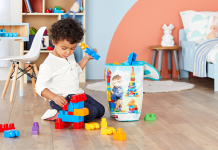Becoming a new mom can be a wonderful experience, but in the opinion of clinical psychologist, Lucie Grové, we do not talk enough about what it really means to have a newborn baby. Lucie writes…
Having my twins was stressful and initially I felt incompetent and scared to be a new mom. I experienced a range of emotions, from joy (holding them), fear (will I ever be able to raise them), anger (grieving my freedom and independence) and helplessness (when I struggled to soothe them). These tiny two babies were consuming all of me and it felt like it was never going to stop. I did not have any time for anything else other than feeding
and caring for them. This made me feel isolated, deprived of sleep and exhausted.
I wondered at times how two such small babies could overturn my life so completely. I did not know this new version of me: my body was different, I was different, and my relationship with my husband was different. But as the weeks progressed, I started to settle into my babies’ routine and I became less anxious and more confident in my new role as a mom. Reflecting back, I realised that leaning onto my family and friends during this
time made a huge difference.
Accept help
It is ok, moms, to ask for help and to accept the help. Having somebody else cook or doing daily household chores while you focus on your baby can make a huge difference. You are not a bad mother, wife or person if somebody else helps with your baby or household tasks while you are adjusting to motherhood.
Talk
Talking about my fears helped me realise that it was ok to be uncertain and to allow myself the time to settle into my new role as a mom. I also started to communicate with my husband about my experiences and what my needs were. I realise that he was also adjusting. Moms, communication is very important. Don’t assume that your partner knows
how you feel or what your needs are – he doesn’t.
Sleep
Asking for help with one of the night feeds enabled me to get a little more sleep at night. I realised that taking care of myself was more important than trying to control and do everything myself. I napped when they were sleeping – yes, moms, it is OK to sleep in the day or to ask somebody to watch your baby while you are sleeping. Taking care of yourself is vital. You cannot care for your baby if you are not ok.
Accept change
I had to accept that my body had changed and let’s be honest, this was difficult. My pregnancy clothes were too big, but there was no way I was going to fit back into my old favourites. I tried to make some time for myself. I pampered myself with small treats, like taking a bubble bath, enjoying a cup of coffee or just sitting outside. For some moms, feelings like those I experienced do not go away and they are persistent. Postpartum depression or anxiety is real. Most of the time women are so ashamed or guilt-ridden for not experiencing joy after having a baby, that they keep quiet until they cannot cope anymore. Remember, baby blues is not postpartum depression or anxiety. Baby blues is feeling more tearful, overwhelmed and emotionally fragile than usual and lasts for only a few days or weeks after childbirth. Postpartum depression or anxiety symptoms are more severe and persist for most of the time after childbirth, but can develop anytime within the first 12 months of having your baby.
If you recognise any two or more of these symptoms you may be suffering from postpartum depression or anxiety:
Depression: feeling sad, lonely or suicidal; feeling overwhelmed with fatigue; feeling worthless, helpless or guilty; having no interest in caring for your baby or feeling completely unable to; feeling that you are not yourself; feeling angry or irritable; experiencing loss of joy, motivation or interest in your own appearance.
Anxiety: feeling anxious and overwhelmed with motherhood most of the time and this feeling does not go away with reassurance; fear that you might harm yourself, the baby or others; having panic attacks or feeling panicky most of the time; repetitive and intrusive
thoughts of harm coming to your baby that cause great distress and impact your ability to care for your baby. Moms, don’t despair. Postpartum depression or anxiety can successfully
be treated with medication and psychotherapy. Please contact your health care professional to get the support that you deserve.

Dr Lucie Grové with her husband and adorable twins






